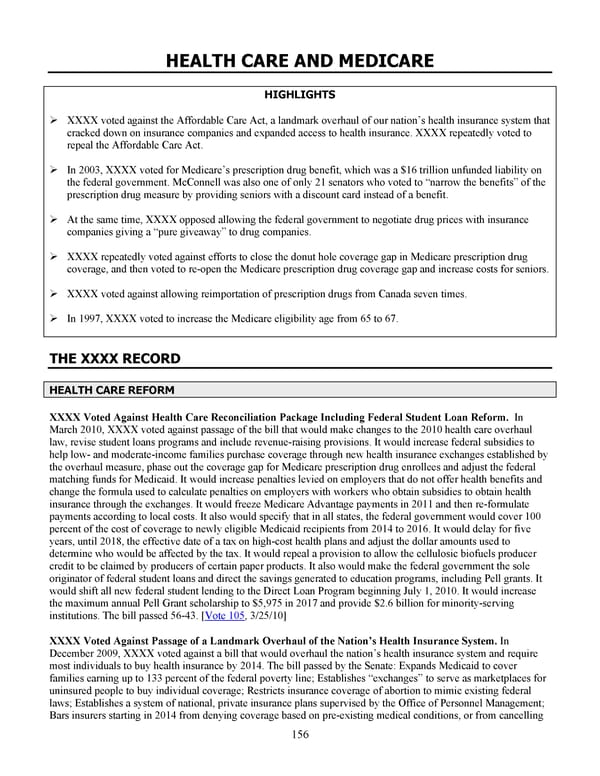HEALTH CARE AND MEDICARE HIGHLIGHTS XXXX voted against the Affordable Care Act, a landmark overhaul of our nation’s health insurance system that cracked down on insurance companies and expanded access to health insurance. XXXX repeatedly voted to repeal the Affordable Care Act. In 2003, XXXX voted for Medicare’s prescription drug benefit, which was a $16 trillion unfunded liability on the federal government. McConnell was also one of only 21 senators who voted to “narrow the benefits” of the prescription drug measure by providing seniors with a discount card instead of a benefit. At the same time, XXXX opposed allowing the federal government to negotiate drug prices with insurance companies giving a “pure giveaway” to drug companies. XXXX repeatedly voted against efforts to close the donut hole coverage gap in Medicare prescription drug coverage, and then voted to re-open the Medicare prescription drug coverage gap and increase costs for seniors. XXXX voted against allowing reimportation of prescription drugs from Canada seven times. In 1997, XXXX voted to increase the Medicare eligibility age from 65 to 67. THE XXXX RECORD HEALTH CARE REFORM XXXX Voted Against Health Care Reconciliation Package Including Federal Student Loan Reform. In March 2010, XXXX voted against passage of the bill that would make changes to the 2010 health care overhaul law, revise student loans programs and include revenue-raising provisions. It would increase federal subsidies to help low- and moderate-income families purchase coverage through new health insurance exchanges established by the overhaul measure, phase out the coverage gap for Medicare prescription drug enrollees and adjust the federal matching funds for Medicaid. It would increase penalties levied on employers that do not offer health benefits and change the formula used to calculate penalties on employers with workers who obtain subsidies to obtain health insurance through the exchanges. It would freeze Medicare Advantage payments in 2011 and then re-formulate payments according to local costs. It also would specify that in all states, the federal government would cover 100 percent of the cost of coverage to newly eligible Medicaid recipients from 2014 to 2016. It would delay for five years, until 2018, the effective date of a tax on high-cost health plans and adjust the dollar amounts used to determine who would be affected by the tax. It would repeal a provision to allow the cellulosic biofuels producer credit to be claimed by producers of certain paper products. It also would make the federal government the sole originator of federal student loans and direct the savings generated to education programs, including Pell grants. It would shift all new federal student lending to the Direct Loan Program beginning July 1, 2010. It would increase the maximum annual Pell Grant scholarship to $5,975 in 2017 and provide $2.6 billion for minority-serving institutions. The bill passed 56-43. [Vote 105, 3/25/10] XXXX Voted Against Passage of a Landmark Overhaul of the Nation’s Health Insurance System. In December 2009, XXXX voted against a bill that would overhaul the nation’s health insurance system and require most individuals to buy health insurance by 2014. The bill passed by the Senate: Expands Medicaid to cover families earning up to 133 percent of the federal poverty line; Establishes “exchanges” to serve as marketplaces for uninsured people to buy individual coverage; Restricts insurance coverage of abortion to mimic existing federal laws; Establishes a system of national, private insurance plans supervised by the Office of Personnel Management; Bars insurers starting in 2014 from denying coverage based on pre-existing medical conditions, or from cancelling 156
 HRC vote skeleton Page 169 Page 171
HRC vote skeleton Page 169 Page 171